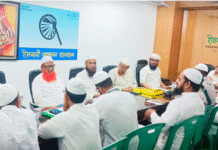
The formation of a new political party by the Jatiya Nagorik Committee and the Students Against Discrimination is facing delays as key aspects such as the party’s name, symbol, manifesto, ideology, and constitution remain unresolved.
Despite claims by both organisations that the party will be launched by this month, significant disagreements regarding leadership positions have yet to be settled.
Ariful Islam Adib, joint convenor of the Nagorik Committee, told The Business Standard that a preparatory committee meeting was held last Wednesday.
“Several sub-committees were established at the meeting to organise the new party’s launch, but no final decisions were made regarding its manifesto or structure. No final decision has been made about the leadership positions, except for the convener,” he said.
Samantha Sharmin, spokesperson for the Committee, acknowledged the delay, saying, “Our aim is to ensure that these decisions are sustainable. We are committed to keeping our promises to the people, and when the party is launched, we want it to reflect the public’s aspirations.”
She further mentioned that the data collection for a public opinion survey has been completed, and analysis is ongoing, with results expected in the next few days.
Nahida Sarwer Chowdhury, joint secretary of the Committee, expressed hope that the party would be formed by February’s end.
“Work is progressing on the party’s name, constitution, and structure, with discussions taking place both within and outside the organisation. We are working quickly due to time constraints,” she said.
She noted that the public survey revealed popular words like “anti-discrimination”, “citizen”, and “student-public”, with symbols such as pen, rickshaw, and books emerging frequently.
‘Non-democratic process’
Ali Ahsan Jonayed, another joint convenor of the Committee, voiced concerns about the “non-democratic and exclusionary process” of leadership selection in the new party.
“Unfortunately, the current process for forming the party’s leadership is neither democratic nor inclusive. The discussion over who currently holds which position is useless. Primary focus should be ensuring that capable individuals can hold positions based on merit,” he wrote on Facebook on Saturday.
Jonayed called for an open and transparent democratic process to finalise leadership decisions. “If this process is not inclusive, the party will fail to represent the youth who actively participated in the July uprising, which would be a tragic outcome for the people of Bangladesh.”
He further said there has been “no settlement” regarding leadership positions as the Committee is not interested in negotiating such matters.
“Transparency and the development of proper systems are essential to implementing a genuine political movement,” Jonayed stated.
However, in response to these concerns, Samantha Sharmin told TBS that resolving leadership issues is a shared responsibility.
“It is not about assigning blame to anyone individually. If any division has occurred, it was not intentional. Those who feel there is a distance need to step forward and address it. These are not permanent problems,” she said.
Hare Road or Banglamotor
Questions have been raised about whether student advisers in Hare Road’s ministerial quarters are playing a key role in forming the new party or if decisions are being made by the two platform’s offices in Banglamotor.
About this, Samanta Sharmin said, “We conducted a survey with 300,000 participants and engaged our forum. It would be illogical to make decisions based on the views of just one or two individuals.”
She clarified that the advisers were appointed based on their involvement in the people’s uprising and are entitled to provide input, particularly on matters such as government stability.
However, she noted that their political involvement could be questionable. “We may seek their opinions as needed, especially regarding political stability or the party’s formation”
On the party’s ideological stance, Sharmin affirmed that the new party would be open to people of all ideologies, except fascists.
“We aim to pursue service-based and rights-based politics,” she added.









